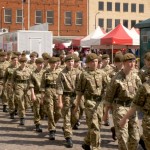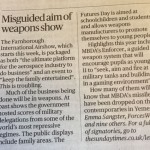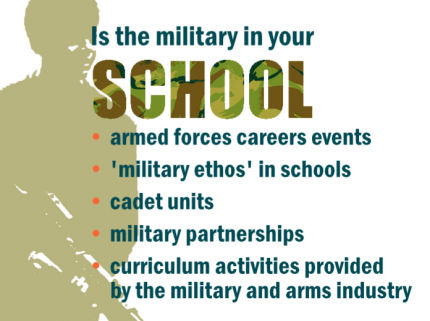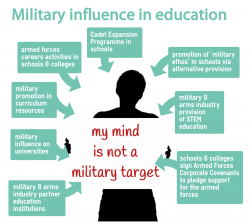 The UK armed forces visit thousands of schools each year. They offer career presentations, curriculum resources and other activities aimed at promoting the interests of the military and long-term recruitment. Since 2012, the Department for Education have promoted ‘military ethos’ programmes such as cadet units in state schools and ‘alternative provision with a military ethos’.
The UK armed forces visit thousands of schools each year. They offer career presentations, curriculum resources and other activities aimed at promoting the interests of the military and long-term recruitment. Since 2012, the Department for Education have promoted ‘military ethos’ programmes such as cadet units in state schools and ‘alternative provision with a military ethos’.
The armed forces and arms companies are increasingly involved in the provision of STEM (science, technology, engineering and maths) activities for school and college students. and they also sponsor a number of careers-led secondary schools. The armed forces also now sponsor youth organisations like Girlguiding and Scouts. See more here.
Should the armed forces by given access to children within education? How can we challenge their activities in schools and colleges? How can a more balanced view of the military be given to young people?
While there are claims that school involvement is not about recruiting young people, the Ministry of Defence has itself stated that visits to educational establishments are a ‘powerful tool for facilitating recruitment’.
In having contact with young people, the military aim to sow seeds in impressionable young minds. In 2007, the head of the Army’s recruitment strategy said, “Our new model is about raising awareness, and that takes a ten-year span. It starts with a seven-year-old boy seeing a parachutist at an air show and thinking, ‘That looks great.’ From then the army is trying to build interest by drip, drip, drip.”
The influence of military interests in education and youth activities raises concerns around:
- recruiting-related activities in school
- child welfare issues
- the unrepresentative portrayal of the armed forces
- weapons in schools and at public events aimed at interesting children and teenagers in a military career
- the need for balance in teaching controversial issues
- the lack of balance with other career providers coming into schools
- the lack of parental consultation and policy scrutiny
- concerns around targeting disadvantaged areas and prioritising over other youth activities
- lack of balance with education for peace
- marginalising individuals and groups to do not wish to participate in military-related activities
See our briefing on Military involvement in education and youth activities in the UK.
We recognise the importance of debate and critical thinking in helping young people make an informed choice about the military and its activities. This is particularly important for those thinking of a career in the forces, a uniquely risk-laden occupation. If the military are allowed to have a presence and influence in the UK education system then it should be balanced by a thorough exploration of opposing views and approaches, as demanded by the 1996 Education Act.
Useful resources
Bringing it up to date: 100 years on from the First World War
This article, summarising ForcesWatch work, was first published on the White Feather Diaries website.
Scotland petition about armed forces in schools is launched amid cadets row
Three Days on the Western Front: A student’s experience of a school trip to the First World War battlefields
Remembrance is now a brand – what place does it have in schools?
Peace education and the promotion of the armed forces in UK schools
 This report highlights that peace education is not being promoted in schools. This is counter to the recommendations made by the United Nations Committee on the Rights of the Child to the UK Government that peace education should be part of the curriculum.
This raises concerns particularly with the increased promotion of the military within schools through the Department for Education's 'military ethos' programme and free military-related learning resources, and as the armed forces continue to conduct a substantial 'youth engagement' programme.
This report highlights that peace education is not being promoted in schools. This is counter to the recommendations made by the United Nations Committee on the Rights of the Child to the UK Government that peace education should be part of the curriculum.
This raises concerns particularly with the increased promotion of the military within schools through the Department for Education's 'military ethos' programme and free military-related learning resources, and as the armed forces continue to conduct a substantial 'youth engagement' programme.
Armed forces visits to schools debated in the Welsh Assembly!
Concerns about armed forces visits to secondary schools in Wales
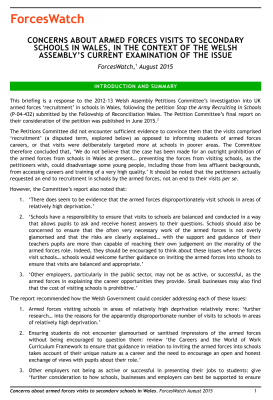 This briefing is a response to the 2012-13 Welsh Assembly Petitions Committee’s investigation into UK armed forces ‘recruitment’ in schools in Wales, following the petition Stop the Army Recruiting in Schools (P-04-432) submitted by the Fellowship of Reconciliation Wales. The Petition Committee’s final report on their consideration of the petition was published in June 2015.
This briefing is a response to the 2012-13 Welsh Assembly Petitions Committee’s investigation into UK armed forces ‘recruitment’ in schools in Wales, following the petition Stop the Army Recruiting in Schools (P-04-432) submitted by the Fellowship of Reconciliation Wales. The Petition Committee’s final report on their consideration of the petition was published in June 2015.
The Unseen March
Update on Army attempt to obtain sensitive student data for recruitment purposes
A former cadet’s experience of the Combined Cadet Forces
Looking back on being part of a school-based cadet unit, the author reflects that, despite the fun and experience to be gained, the benefits could be achieved with non-military activities which would not present a dangerous and risk-laden career as an enjoyable and exciting activity or expose young people to an environment where bullying and hazing are normalised.


